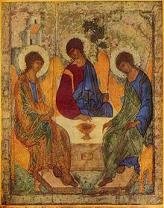 According to St. Gregory Nazianzen, there is no interior process in the Godhead; no dialectic of the three persons; no becoming; no tragedy in the Absolute, which might necessitate the Trinitarian development of the divine being in order that it be surmounted or resolved. If the Church speaks of processions, of acts, or of inner determinations, these expressions – involving, as they do, the ideas of time, becoming and intention – only show to what extent our language, indeed our thought, is poor and deficient before the primordial mystery of revelation.
According to St. Gregory Nazianzen, there is no interior process in the Godhead; no dialectic of the three persons; no becoming; no tragedy in the Absolute, which might necessitate the Trinitarian development of the divine being in order that it be surmounted or resolved. If the Church speaks of processions, of acts, or of inner determinations, these expressions – involving, as they do, the ideas of time, becoming and intention – only show to what extent our language, indeed our thought, is poor and deficient before the primordial mystery of revelation.
What St. Gregory is attempting to convey is that the human language we employ in order to describe the Trinity, is limited and can-not truly express the mystery of the Trinity. We talk about the Son and the Holy Spirit proceeding from the Father. This gives the impression that at one point the Son and the Holy Spirit were not in existence. This is false. There was never a time that the Son and the Holy Spirit didn’t exist. Rather, the word proceeds, when predicated of an eternal being, does not put any sort of sequence in the existence of the Three Persons. Of course this is impossible for us to understand since it is truly a mystery. Our created intelligence cannot conceive, truly, what the Holy Trinity IS.
It is in such a spirit as this that St. Gregory speaks in his oration on baptism: No sooner do I conceive of the One than I am illumined by the splendor of the Three. He continues by saying: No sooner do I truly distinguish them than I am carried back to the One. When I think of any One of the Three, I think of Him as the whole, and my eyes are filled, and the greater part of what I am thinking of escapes me.
So we as Christians are called to believe in a God which is beyond our human comprehension. We are not meant to define or be able to explain what the nature of are God really is. Of course this is a challenge to many Western persons who are deeply steeped in the scientific method. We unconsciously think that the only truth is a truth we can explain. Of course if this is true, then we do not need faith. What kind of God would we have if we could completely explain Who He Is? To be our God, He must be beyond our comprehension and understanding. That is what makes Him our God. If our limited human intellects could express Who He Is, He would not be God.
